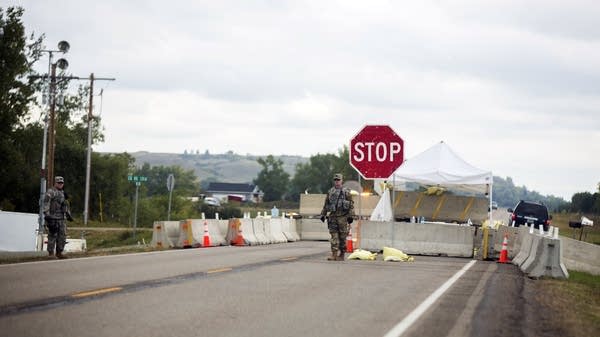Authorities lack 'manpower' to remove pipeline protest camp

Go Deeper.
Create an account or log in to save stories.
Like this?
Thanks for liking this story! We have added it to a list of your favorite stories.
The scores of people who set up a new camp of tents and teepees on private land in North Dakota to protest the Dakota Access oil pipeline won't immediately be removed, the local sheriff's office said Monday.
The Morton County Sheriff's Office doesn't currently "have the manpower" to remove the more than 100 protesters from the property along the pipeline route, spokeswoman Donnell Preskey told The Associated Press.
"We can't right now," she said.
Preskey said the land is owned by pipeline developer Energy Transfer Partners, which bought it last month from a rancher for an undisclosed price. The Texas-based company did not immediately respond to an email seeking comment Monday.
Turn Up Your Support
MPR News helps you turn down the noise and build shared understanding. Turn up your support for this public resource and keep trusted journalism accessible to all.
The protesters, many of whom are Native Americans who have been demonstrating against the four-state pipeline for months, said in a statement Sunday that the land is theirs by an 1851 treaty and they won't leave until the pipeline is stopped.
"We never ceded this land," Joye Braun, a protest organizer said in a statement.
The $3.8 billion pipeline, most of which has been completed, crosses through North Dakota, South Dakota, Iowa and Illinois. Opponents worry about potential effects on drinking water on the Standing Rock Sioux's reservation and farther downstream on the Missouri River, as well as destruction of cultural artifacts.

The ranch purchased by the company last month is more than a century old and was the first to be inducted into the North Dakota Cowboy Hall of Fame. It is within a half-mile of a larger encampment on U.S. Army Corps of Engineers' land where the Standing Rock Sioux Tribe and hundreds of others have gathered in protest.
Protesters do not have a federal permit to be on the corps' land, but the agency said it wouldn't evict them due to free speech reasons. Authorities have criticized that decision, saying the site has been a launching point for protests at construction sites in the area.
In September, protesters and private security clashed after construction crews removed topsoil across an area about 150 feet wide stretching for 2 miles on the ranch. The incident came one day after the Standing Rock Sioux Tribe filed court papers saying it found several sites of "significant cultural and historic value" along the pipeline's path.
Authorities said four security guards and two guard dogs were injured; the tribe says protesters reported that six people had been bitten by security dogs, and at least 30 people were pepper-sprayed.
More than 260 people have been arrested since demonstrations began in August, nearly half of whom were arrested over the weekend during a large protest at a pipeline construction site.
North Dakota Attorney General Wayne Stenehjem has asked the company to explain its purchase of the ranch and how it complies with the state's Depression-era anti-corporate farming law.
North Dakota law generally bars corporations from owning agricultural land unless the property is controlled by a farm family, though there are some exceptions.
The company said in a letter delivered to Stenehjem's office Monday that it purchased the land "in an effort to enhance safety of its workers." The company said it would transfer ownership of the land or use it "for some other use" that complies with state law after the pipeline is built.




